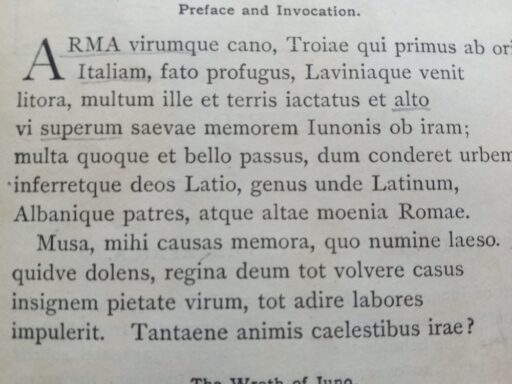Some months ago I decided to read Vergil’s Aeneid, all of it, in Latin. A rash idea, given my spotty knowledge of the language. But curiosity and the uneasiness of having missed some essential wisdom by not having met the Aeneid in Latin drove me on.
I’m half-way through Book 3 (of 12) now. I feel well rewarded already by what I’m learning in many areas: about Roman myth and history, for example, or about the continuing debate over whether, in Daniel Mendelsohn’s words, the Aeneid “is a celebration or a critique of imperial rule.”
But so far the greatest reward of Aeneid-immersion has been my discovery of what it is like to learn to read. I don’t mean what it is like to learn to read a foreign language. I mean what it is like to read meaningfully-related words at all—to explore what happens as one goes about disentangling sense from a chaos of black marks on a page.
The first stage of this process is not for the faint of heart. In fact, the deeper I went into the Aeneid, the more I felt like Aeneas himself in Book One: buffeted on the high seas by a savagely resentful goddess. In Aeneas’s case, this role is played by the queen of the gods, Juno, still smarting from Paris’s declaring Venus, not Juno herself, the most beautiful female of all. And then, responding to the slight, taking out her wrath on Paris’s father Priam and the entire people of Troy.
In my case, as a struggling reader of Latin, the role of tormentor has been played by a less dramatic but no less implacable force: Vergil’s extraordinary freedom with word order.
It’s a freedom enabled by Latin’s capacity for inflection. Whereas English counts largely on predetermined word sequences to determine meaning, Latin prefers to inflect words, to alter their endings in such a way that meaning can be established by linking words through those altered endings, rather than by relying for meaning solely on a word’s position within a chain of other words.
Example, the opening lines of the Aeneid:
Arma virumque cano, Troiae qui primus ab oris
Italiam, fato profugus, Laviniaque venit
Litora, multum ille et terris iactatus et alto
Vi superum saevae memorem Iunonis ob iram….
Now, dutifully, I look up every word in my Latin glossary, translate them individually, and put them together in the same order as the original:
Arms hero and sing Troy who first from shores
Italy fate exile Lavinian and came
shores much he both lands tossed and deep
power gods cruel unforgetting Juno because rage….
Uh-oh—so much is missing in this “translation” that I might as well have left it in Latin. It’s still a garble. But I know what the main problem is. The words aren’t arranged in the order in which I’m used to expect them.
Not to worry. A way to un-garble the Aeneid was worked out long ago, in 1917, by Frederick Holland Dewey, who in his literal interlinear translation first rearranged the Aeneid’s lines according to a plausible English sequencing of words:
Arma virumque cano qui primus ab oris Troiae, profugus fato, venit Italiam Laviniaque litora multum iactatus ille et terris et alto, vi superum, ob memorem iram saevae Iunonis….
But Dewey knew he couldn’t just translate those rearranged words. He knew that word order isn’t the only problem. Key words in English are missing from a strictly literal translation, words that fill in for Latin inflections—as well as plug the voids left by Latin’s lack of articles like “a” and “the.”
Here’s Dewey’s own fully-equipped English translation, based on his rearranged scheme above:
Arms and the hero I sing, who first from the shores of Troy, an exile by fate, came to Italy and the Lavinian shores; much tossed was he both on the lands and on the deep, through the violence of the gods above, because of the unforgetting rage of cruel Juno….
Dewey’s rearranged translation must have saved the neck of many a schoolboy back in the day. It’s certainly saving mine now as my struggles with word order continue. Dewey is the perfect life raft for us beginning Vergil students who feel Latin words coming at us from all directions at once, like the winds sent by the god Aeolus from every direction of the compass to batter Aeneas’s ships.
But if Dewey’s rearranging helps us English speakers get Vergil’s words into one kind of order, they destroy another kind: the order of Vergil’s lines themselves, the order brilliantly achieved as Vergil bends his own inflected speech to fit the metrical form (dactylic hexameter) of a foreign language: Homer’s Greek. And not only bends his speech, but also bring out new meanings in it by repositioning words in unexpected ways.
As a result, the two arrangements of those same Latin words of the Aeneid—Vergil’s and Dewey’s—produce a profound difference in meaning. It’s not just that Dewey’s rearrangement is handier for us English speakers than Vergil’s; it’s that Dewey’s rearrangement destroys the Aeneid’s poetry. I can only guess how Latin speakers in Vergil’s time would have “heard” Dewey’s rearrangement: as awkward and alien in the extreme, perhaps even as unintelligible. And certainly they would have felt the result as ugly, for without poetic meter Vergil’s wit and artistry and music disappear.
It’s hard getting to the point in Vergil’s Latin where one can begin to think about casting the life raft behind and about swimming for shore under one’s own steam. So much of the confidence necessary to do so comes from gradually being able to hear Vergil’s words as Vergil intended them to be heard. Because it’s only then, after Dewey has been let go of at last, that Vergil’s particular ordering of just those words becomes the record of Vergil’s own poetic voice, a voice that becomes clearer, more alive, and more compelling the more those previously scattered words invite an active communication with me, the reader.
And what a reward for one’s labor this is! Let’s call this moment of achievement—of hearing Vergil’s voice (if only partially and at a distance)—the “glory of reading.” The phrase is Christine Smallwood’s, in a recent issue of The New York Review of Books:
The glory of reading, the reason for reading at all, is to encounter the new. To be surprised by where a sentence lands, to trip over an unexpected adjective, to be thrown out of the dullness of habit into a new and unfamiliar place. That’s the whole point—that of all the possible words that could come next, this one does. That of all the possible worlds, the writer—someone who is not you, someone who has thoughts and ways of expressing those thoughts that you could never have—imagined this one.
After getting his PhD in English literature, George Dardess taught close reading to his own students until his retirement. Since then he has been ordained a Deacon in the Roman Catholic Church and written several books on Muslim-Christian relations. He has also created the graphic novel Foreign Exchange.





